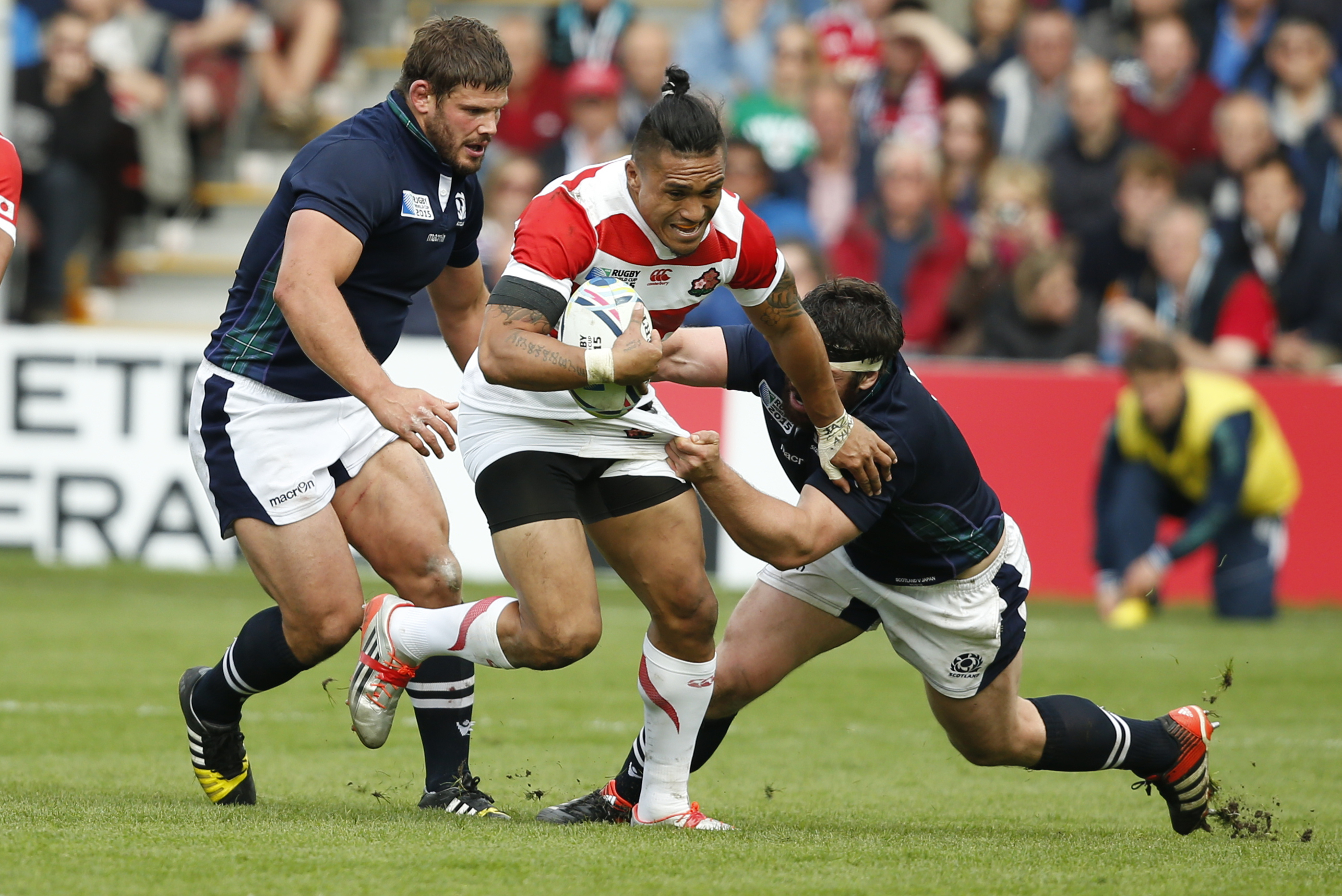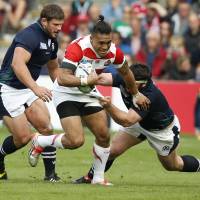Following the Japan Rugby Football Union's recent announcement that Jamie Joseph would take over as head coach of the men's national rugby union team, the governing body explained its selection process for Eddie Jones' successor and the team's plans for the future on Monday.
JRFU managing director Noriyuki Sakamoto said at a news conference that after Japan's success at last year's World Cup in England, Japanese rugby would look to achieve even more at the 2019 World Cup and the 2020 Olympics in Tokyo as the host nation.
"Making it to the final eight or even final four is where we are setting our sights," Sakamoto said. "The national team for 2019 will have to be better than what it was in 2015."
To kick off the grand plan toward 2019 and beyond, JRFU chose Joseph, a 46-year-old New Zealand native, to lead the team. Masato Tsuchida, director of national team development, said that the head coach screening process started last August, with the selection team looking at as many as 60 candidates, including Japanese.
The group was eventually narrowed down based on three basic criteria:
— Achievements as a head coach at a high level, such as the World Cup or Super Rugby.
— Ability to lead the team and communicate well with his players and staff.
— Genuine desire to develop the national squad, with great knowledge of Japan and the Top League.
Masahiro Kunda, director of rugby for the national rugby union, said that he and the selection team concluded that Joseph was the best man for the job and flew to New Zealand for negotiations.
"We felt eagerness and a sense of responsibility toward the job from him" said Kunda, who played at three World Cups and served as an assistant under Jones between 2011 and 2013.
"Looking at him, he's got world-class coaching capacity. He's led his team to a Super Rugby championship. That's big, too."
Joseph, who has been head coach of the Highlanders since 2011, guided the club to its first-ever Super Rugby title last season. Joseph will lead the Highlanders in the upcoming Super Rugby campaign and will begin work with Japan after that.
Jones installed a work-harder-than-the-rest philosophy in his team with better preparation, and that was one of the major reasons for the Brave Blossoms' breakthrough in Britain last fall on the sport's biggest stage.
Kunda said that Joseph will impose as harsh a training regime on his players as his Brave Blossoms predecessor did.
"Plus, he really loves Japan. In fact, he's really fluent in Japanese and I supposed he'll be coaching in Japanese for the most part," Kunda said of Joseph, who played for the Sanix (now known as the Munakata Sanix Blues) in the Top League between 1995 and 2002 and was capped nine times for the Japan national team as a flanker. Joseph, a native of Blenheim, New Zealand, also won 20 caps for the All Blacks.
Scrum-half Fumiaki Tanaka, who played under Joseph for the Highlanders for the last three seasons, told Nikkan Sports that he thinks the new coach will be a good fit for the national team.
"When you don't have spirit during practice, he'll make you do sprints and stuff. Like Eddie, he emphasizes playing with heart," Tanaka said of Joseph. "He really likes Japan and he can speak Japanese. He gets heated sometimes, but he's basically a very smart man. I think that the Japan national team will be a different team from what it was under Eddie. I'm excited about it."
Meanwhile, the Joseph-led Brave Blossoms will develop themselves in a more practical way, playing more international games, including test matches.
Tsuchida, a former head coach and general manager of the Top League's Suntory Sungoliath, said that Jones held a 120-day training camp for the Japan national team leading up to the 2015 World Cup, but that number will be reduced to about 50 days this year.
He added, however, that Japan would play a lot more test matches against Tier One nations or their equivalent, including the games of the Sunwolves, who are making their debut in Super Rugby this year.
"We played five such games in 2013 and that's the most we've ever played," Tsuchida said. "But in 2016, we have 15 games in Super Rugby, a couple of games against Scotland and one against Wales lined up. So we will be able to play at least 18 games like that this year."
Joseph will be asked to work closely with the Sunwolves, for whom fellow New Zealander Mark Hammett will assume the role of head coach.
Japan will play the Scotland games in June at home, and the JRFU has yet to establish whether Joseph, who will be in the middle of the Super Rugby season, or an interim coach will manage those contests.
The JRFU also revealed that Kensuke Iwabuchi has retained his job as general manager.



















With your current subscription plan you can comment on stories. However, before writing your first comment, please create a display name in the Profile section of your subscriber account page.